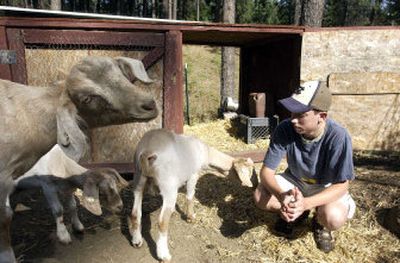New adventure

They’re fun, they’re ornery and they’re too cute for neighborhood kids to resist. They also make a fine alternative to beef.
These are some of the lessons learned by Chris Gregerson as he paved his way through a new 4-H project offered in Kootenai County this year. He’s raising goats for meat.
Raising livestock is nothing new for Chris. The 16-year-old Lake City High School student has wrestled with swine and pampered prize-winning rabbits in preparation for other 4-H competitions. At age 10, in his first year of showing rabbits, he won the overall grand champion at the county fair. But raising Boer, a breed of meat goat, is a new venture.
The project has proven successful in other 4-H regions, especially southern states where goat meat is popular enough to be stocked on supermarket shelves. With goat as a primary meat in many parts of the world, such as the Middle East, Mexico and Asia, the demand has increased in the United States as immigration increases. After two years of meetings and votes, raising goats for meat is now an option for Kootenai County 4-H members.
Chris’ project started in May when he and his two brothers each purchased 8- week-old goats. Chris chose the largest, a bossy female, who remained nameless as of this interview. He was considering “Spot,” for the brown circle on his goat’s back, he said. Whether they are for pets or meat, all animals entered in the North Idaho Fair need a name.
His brother, Randy, 19, is the project leader and has been involved with 4-H for 10 years. . His parents gave him a goat for Christmas when he was 10 and he has raised dairy goats since. It was his encouragement that led his brothers to take on the meat goat challenge.
“I thought it would be a minimal amount of money put into it, and about the same effort as pigs,” he said.
Randy convinced his brothers that the effort would be less than with dairy goats, which require constant milking. Chris and his three younger brothers share the tasks of feeding their goats twice a day with hay, goat feed and a soy protein powder. Fresh water and a mineral salt block are also offered. The goats’ goal weight is between 70 and 120 pounds by the fair auction, which means gaining about 4 ounces per day. The brothers’ measurement method has been slightly unscientific – Randy picks up a goat and stands on a bathroom scale.
Goats need exercise, which Chris handles with a collar and leash. The animals seem to enjoy it and he found the task to be simpler than when he tried the same method with his stubborn pigs.
“You have more control over them,” he said. “It’s easier.”
The brothers expect their goats to compete with about 13 others at the fair, and aren’t worried about finding buyers. Goat meat, called “chevon,” is known for its low fat content and easy digestibility.
“There’s a really good market,” Randy said. “It’s like venison, but not as gamey.”
The Gregersons belong to the Pine Tree 4-H Club, which they believe to be the oldest 4-H club in Kootenai County. Their mother, April Hinkelmann, leads projects for the club in rabbits, goats and poultry. The club, led by Gene Smith for more than 30 years, primarily deals with livestock.
The brothers use their own money to purchase grain and other supplies. They always make a profit, although they have estimated that it works out to about a dollar per hour if they calculate all of their time. It’s still worthwhile, believes Randy, who is now taking pre-veterinarian courses at North Idaho College.
“It’s a good learning experience for future life skills,” he said.
Their mother always expects a few tears when it comes to auction day, especially from the younger members.
“It’s very hard for them,” she said. “You get attached.”
The fair is a busy time for Chris as his goat will need daily care, plus shaving and washing for showing. His 4-H club keeps him involved in community projects such as road and cemetery clean-ups. He also plays baseball for his school team, likes repairing engines and hopes to work as a mechanic one day.
He expects that “Spot” will bring in a minimum of a dollar a pound, but more valuable is all the experiences he’s had through 4-H.
“It gets me out, gets me to know people,” he said. “It’s probably one of the coolest things I’ve ever done.”